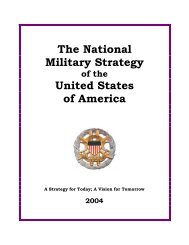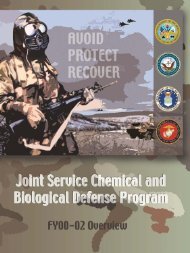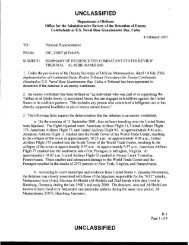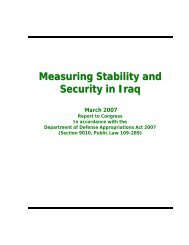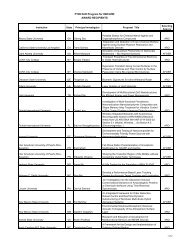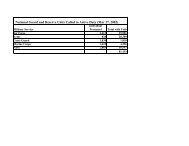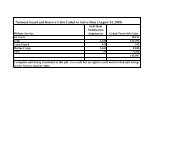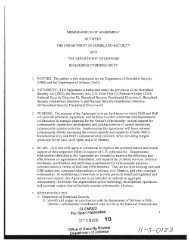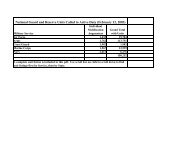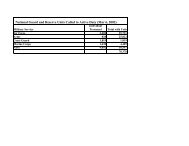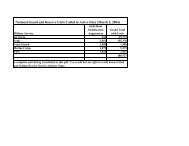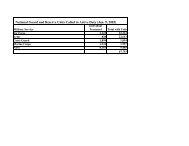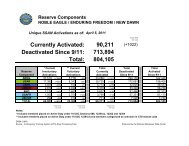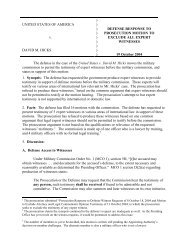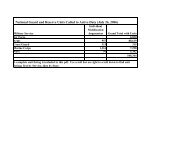Report - United States Department of Defense
Report - United States Department of Defense
Report - United States Department of Defense
Create successful ePaper yourself
Turn your PDF publications into a flip-book with our unique Google optimized e-Paper software.
UNCLASSIFIED<br />
For the East-West corridor, Italy will fund part <strong>of</strong> the road in Herat Province from Herat City to<br />
Chest-e Sharif (155 km), and also from Maiden Shar (Wardak Province) to Bamyan (Bamyan<br />
Province). The Asian Development Bank and Japan have nearly completed the road from<br />
Bamyan City to Yakawlang in Bamyan Province. The remaining sections <strong>of</strong> the East-West<br />
corridor are unfunded.<br />
DoD is currently conducting emergency repairs to the Salang Tunnel. The Salang Tunnel runs<br />
north <strong>of</strong> Kabul through the Parwan Province along Highway 1 and is viewed as a major<br />
component <strong>of</strong> the Northern Distribution Network (NDN). The non-emergency Salang Tunnel<br />
reconstruction project is using CERP as its funding mechanism, and solicited for bids in August<br />
2012. In September 2012, the Omran Holding Group, an Afghan-owned and -operated company,<br />
was selected as the preferred bidder. Currently, design and procurement <strong>of</strong> materials processes<br />
are underway. The project is expected to begin major construction efforts in spring 2013 and be<br />
completed by December 2013. The intent <strong>of</strong> the project is to make the route trafficable for<br />
another three years to allow the Ministry <strong>of</strong> Public Works enough time to find an international<br />
donor that is willing to build an alternative route to the Salang Tunnel. The search for an<br />
international donor is underway, and thus far, the World Bank and Asian Development Bank<br />
have both expressed interest in funding this project. In response to a request from GIRoA and to<br />
complement activities underway, USAID will provide operations and maintenance support for<br />
the Salang Tunnel for the next three years.<br />
Rail<br />
Rail infrastructure remains limited in Afghanistan, despite a number <strong>of</strong> internationally-funded<br />
rail projects. The Afghan Rail Authority (ARA) has been approved and a budget was created in<br />
November 2012. The budget included staffing at 50 percent, as the other half will not be needed<br />
until the second year <strong>of</strong> operation. This budget was not included as a line item in the Ministry <strong>of</strong><br />
Public Works (MoPW) budget for this year, primarily because the Afghan government could not<br />
fund the ARA. Asian Development Bank (ADB) and the European Union (EU) have come up<br />
with a way to fund the top five to seven positions for this year, provided that MoPW appoints<br />
and funds the director’s position. This proposal was sent up in January 2013, and as <strong>of</strong> February<br />
7, there has been little to no movement on this action.<br />
The ARA is urgently needed, as there are several governmental and non-governmental<br />
organizations considering the possibility <strong>of</strong> constructing and operating rail in and through<br />
Afghanistan. Without the ARA, no regulatory authority exists to set rail construction standards<br />
or a standardized rail gauge for the nation. Three to five different organizations have conducted<br />
rail feasibility studies for the Afghan government, which must make a decision soon to<br />
determine which study makes the most sense for the nation, stand up the leadership <strong>of</strong> the ARA,<br />
and produce the basic rail construction laws, policies, and regulations to prove to the<br />
international community that they are serious about the potential for railway operations within<br />
their borders. Failure to do so will result in billions <strong>of</strong> dollars being pulled from this project and<br />
reallocated to current projects that are making progress.<br />
In addition to the budget, ADB has produced the legal and regulatory framework needed for the<br />
ARA, which must be approved by Parliament. The legal and regulatory framework has been<br />
163



